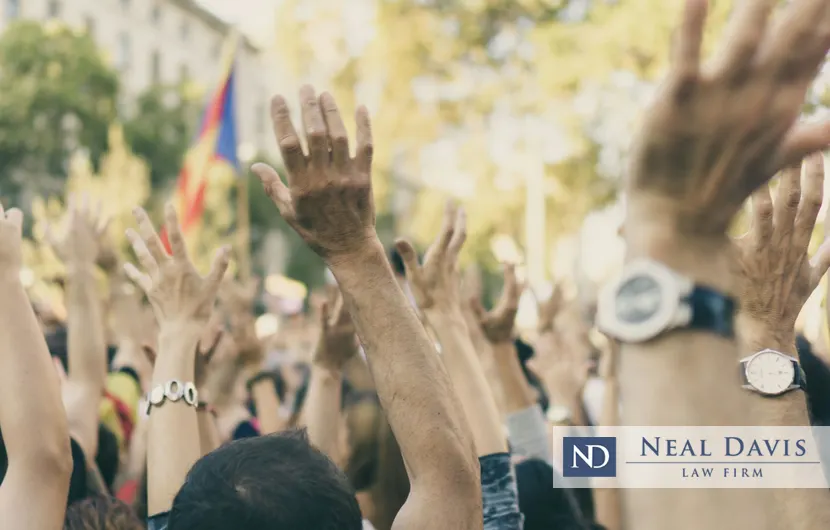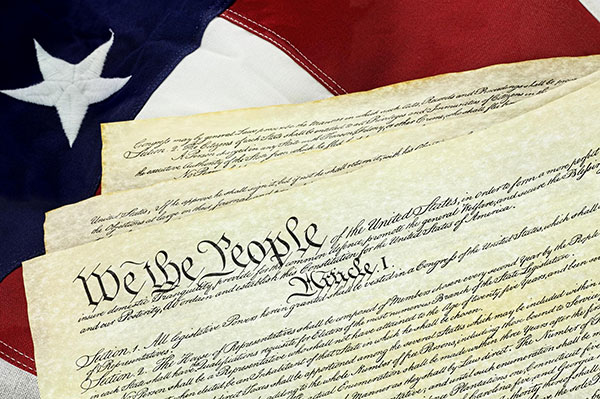
With hundreds of students being arrested during pro-Palestine protests at universities across the country, including the University of Texas at Austin, concerns have arisen about whether such students can be expelled from their schools or even face criminal charges.
Clearly, it’s vital that these students secure experienced legal representation to protect their rights. The Houston-based Neal Davis Law Firm has such experience, having defended students facing Title IX investigations and having fought for Americans accused of a variety of criminal offenses.
Texas students’ charges were dropped
At the University of Texas at Austin, 57 persons were arrested during an April 25 protest on the campus lawn, where they’d created an encampment. According to National Public Radio (NPR), when a judge found insufficient evidence to proceed, Travis County Attorney Delia Garza dropped misdemeanor criminal trespassing charges against all 57 of them.
However, just 4 days later, UT police and Texas Department of Public Safety troopers arrested nearly 80 more protesters who’d gathered on the south lawn of the campus to set up a new encampment for protests.
In view of that, Garza’s office said in a statement, “We will continue to individually review all cases presented to our office to determine whether prosecution is factually and legally appropriate.” In other words, students’ fates will be determined on a case-by-case basis.
Even if they are not charged with a criminal offense by law enforcement authorities, could protesters at UT and elsewhere risk punishments from the universities themselves, such as being expelled from school and banned from campus?
Again, that depends on the individual case, including the nature of their acts during a demonstration, the campus where it was located and the inclination of local authorities to take legal action against them.
Reasons Why Criminal Charges are Dropped or Dismissed
Learn why charges might be dropped or dismissed before a trial.
Free speech rights have legal limits
Neal Davis, founder of Houston’s award-winning Neal Davis Law Firm, says it is vital that protesters understand their legal obligations along with the right to free speech.
“The right to protest is protected by the U.S. and Texas constitutions,” Davis says. “But that right has limits.”
He says government entities and colleges can enact “reasonable time, place and manner” restrictions or regulations regarding protests, as long as such rules are neutral and do not discriminate against a particular group or viewpoint.
Texas lawmakers passed such a law in 2019, designating all common outdoor areas at public universities as traditional public forums and allowing anyone to exercise free speech there. “Anyone” includes others besides faculty and students.
However, Davis says, “Activities must be lawful and not disrupt the normal functions of the campus.”
So, while the right to protest is constitutionally protected, there are well-established exceptions to the extent of free speech. According to Davis, these include:
- Intimidation and true threats to harm another person. Such threats need not escalate to actual violence for them to be deemed improper use of free speech.
- Inciting imminent violence or destruction of public property. Inciting or encouraging lawless actions that are likely to occur does not have First Amendment protections to free speech under the U.S. Constitution. The key distinctions are that the incitement is directed to produce imminent lawless actions and is likely to result in such actions.
- Unlawful conduct, including civil disobedience, such as sit-ins, camps or blockades. Individuals don’t normally need a permit to exercise First Amendment rights, but some municipalities may require one for large protests or parades, in which case “reasonable time, place and manner” restrictions may apply, Davis says. “Texas law also allows universities to set these restrictions for common outdoor areas,” he says.
With these exceptions in mind, Davis says, “Students may face sanctions if they violate a university’s student conduct code. They can also face a conviction if they violate any criminal law.”
Over 1,700 protesters have been arrested
According to a report by the non-profit news organization The Appeal, police have arrested more than 1,700 persons at pro-Palestine campus protests in the past month, and many face possible criminal charges.
Just last weekend, almost 300 protesters were arrested around the country. Some could face detention, suspension and even criminal prosecution.
The Appeal’s report included a survey that showed that encampments or sit-ins had sprung up on over 70 college campuses across 34 states.
Students are demanding that the U.S. end military aid to Israel, that their schools divest themselves of Israeli companies and that Israel cease its attacks on Gaza.
Can You Take Video or Pictures of Police Officers in Texas?
Learn if and when you have the legal right to take photos or videos of police officers in Houston.
Universities from New York to California balk at protests
At New York’s Columbia University, students created an encampment on the campus as a stage for their demonstrations. They were then notified by the university that they had until a specific time to abandon the encampment and disperse or they could face suspension after further investigation. A reason given for the demand was to ensure campus safety.
Some students would not be permitted “to complete the Spring 2024 semester, including participate in classes or exams in-person or remotely or otherwise submit assignments or engage in any activities affiliated with Columbia University,” read the administration’s warning. “You may lose the semester. If you are scheduled to graduate, you are no longer eligible.”
When law officers arrived, university officials said some students involved in the pro-Palestinian encampment refused to leave and were quickly arrested. Students who left the encampment voluntarily and signed a copy of a form committing them to abide by university policies will not be suspended, but they will be on academic probation through June 2025.
Students have also faced confrontations with authorities at the University of California at Los Angeles, George Washington University in the District of Columbia, Princeton University, Vanderbilt University and Virginia Tech University, where 53 students recently were arrested and charged with trespassing.
Beyond Columbia, other universities have suspended or threatened to suspend students who were arrested for protesting, while others have said they will not do so.
Some universities resist punishing or criminalizing students
Emerson College in Boston, where over 100 protesters were arrested at an encampment, says it will not bring disciplinary charges against the protesters and will “encourage the district attorney not to pursue charges related to encampment violations.”
The college has also moved to support students who were arrested, including posting bail for them and providing housing support for those who were required to remain nearby for court appearances after their dorms were closed for the semester.
Students and faculty at other universities have called on their administrations not to discipline protesters.
The Associated Press reports that University of Texas faculty members gave symbolic votes of no confidence to the school’s leadership after at least 40 demonstrators were arrested on Monday, April 29, on charges of trespassing and disorderly conduct.
Faculty members at Penn (the University of Pennsylvania) have urged university leaders to “respect students’ rights to engage in nonviolent protest” by not summoning law enforcement to make arrests and by refraining from filing disciplinary and criminal charges against peaceful protesters.
“Protesters nationwide face police violence and severe discipline, and the safety and well-being of Philadelphia students exercising their rights are among our foremost concerns,” they wrote.
At another Ivy League school, Yale University, almost 300 faculty members condemned what they called “the criminalization of Yale students engaged in recent acts of peaceful protest” after 48 students were arrested. They demanded that the university take no disciplinary action and urged authorities to drop any charges against them.
Such charges have included Class A misdemeanors which, under Connecticut law, can lead to 364 days in jail upon conviction.
On the other hand, some colleges and universities are turning a deaf ear to calls for leniency and are threatening disciplinary action against students who refused to leave encampments—encampments which, according to the schools, violated their policies.
University of Florida officials said demonstrators could face suspension and even a 3-year ban from campus if they violated specific protest rules, including those that ban possessing weapons, protesting inside campus buildings and using speakers or bullhorns to amplify voices.
The Massachusetts Institute of Technology told students at a growing encampment that it violates policies about registering for campus demonstrations and creates a “potential magnet for disruptive outside protesters.”
Students who break the rules, the school said, will face disciplinary action.
Rights of the Defendant in Texas Criminal Court Proceedings
Learn what constitutional rights criminal defendants have and how these rights are incorporated on state and federal levels.
How can pro-Palestinean protesters be punished?
Student protesters who have been arrested may face a variety of punishments and penalties, if only from the school itself and not due to criminal charges or prosecution.
Such students may have to deal with problems involving their student records, their housing, their financial aid and their graduation eligibility.
The Appeal says even more severe consequences could include suspensions, evictions, expulsions and criminal prosecutions. Such prosecutions would go beyond a college’s authority and would involve local and state laws against trespassing and other offenses.
Whether legal actions will proceed depends largely on the stance of local district attorneys or prosecutors—who may or may not face re-election and who often have broad leeway to file or drop charges after a person is arrested.
Get an experienced Houston-area student defense lawyer
If you or a family member faces a criminal charge involving alleged offenses on a university campus in Texas, notify an experienced Houston-area student defense lawyer today at the peer-honored and award-winning Neal Davis Law Firm.
Contact us today to arrange a confidential consultation.




